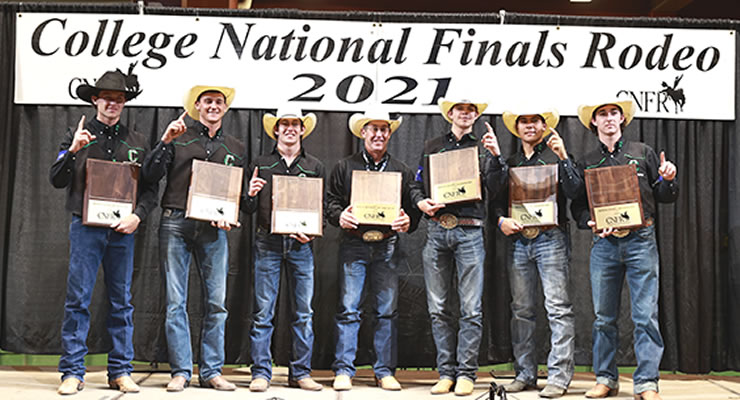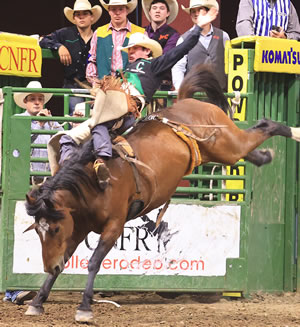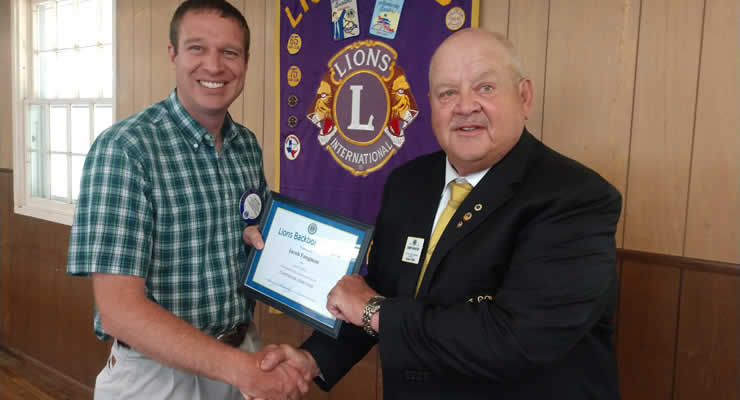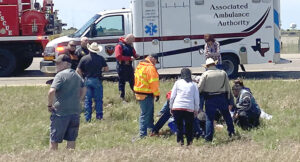
By Ted Harbin, TwisTed Rodeo
CASPER, Wyo. – Cole Franks wasn’t quite sure what to get his dad for Father’s Day.
He and some of his teammates from the Clarendon (Texas) College rodeo team collaborated to provide the perfect present: three national championships in one fell swoop.
Franks is a sophomore at his hometown college, and his dad, Bret Franks, is the rodeo team’s coach. The Clarendon cowboys began competition last week with the goal of winning the men’s team title; they got a little more than that to go with it.
Cole Franks won three rounds and placed in a fourth to win the bareback riding crown. He also added points in saddle bronc riding, and that helped him to the coveted all-around championship. Of all the awards and accolades he received last week at the College National Finals Rodeo in Casper, one sticks out more than the rest.
“Of the three, the team title means the most because since the first day of school, that was the top goal of this team,” he said. “We’ve all been pushing each other for it. We’ve been doing everything we could to make it possible.

“Winning that is a combination of doing something together as a team and for helping Dad win his first national title. It might even mean more for Dad. All of us on the team wanted to win the title, but I know Dad was really wanting to win that team championship.”
Cole Franks was joined at the college finals by bull rider Dawson Gleaves and bronc riders Keene Justesen, Brody Wells, Cash Wilson and Weston Patterson. Five of the six Bulldogs earned points, which also help toward the team standings. Clarendon finished the seven-day championship with 890 points, 100 points better than the runner-up, Panola (Texas) College, which was the defending men’s team titlist.
“We had a great week,” said Bret Franks, who just finished his sixth season leading the Clarendon rodeo team. “The boys came up here and were ready to compete, and they did. The good thing about my guys is that they’ve all been rodeoing, so there wasn’t a whole lot of practicing or worrying about whether or not they’d be ready.
“The thing I’m most proud about is that before I even took this job, I lived in Clarendon. With a facility like the college has, I feel like I could have a national championship within five years if the college got behind a coach. It’s just an awesome facility, and it’s a good place to be. The people are friendly, and the board of regents are awesome and have been very supportive. Yes, this is my sixth year, but we didn’t have a CNFR last year, so this was my fifth try.”
The Bulldogs earned the opportunity to battle for the team title by winning the men’s championship in the Southwest Region. That allowed Clarendon to have a full team of six cowboys in Casper. With more players, there are more chances for points, and Clarendon took advantage of that. Three of the cowboys earned their way into four spots in the championship round, with Cole Franks qualifying in both events.
Weston Patterson finished as the runner-up to the national champion in saddle bronc riding. Cash Wilson was seventh, and Franks finished 12th. But the coach’s son has excelled in bareback riding, even though his dad was a three-time National Finals Rodeo qualifier in bronc riding.
“I’ve coached Cole all the way up in just about everything in rodeo,” Bret Franks said. “I have great friends. Between (bareback riding world champions) Jeff Collins and Mark Gomes, he’s been around winners, and we all have the same mindset. Cole knows how to listen and respond.
“What I coach is fundamentals. It’s pretty simple; there’s no science to it other than the mentality of it. There are four or five things you have to do in bareback riding fundamentally. If you do those things really good or better than everybody else, you’re going to be successful. That’s the way I’ve always taught Cole.”
Strong fundamentals work at all level of sport. Good athletes know well the drills that help them focus on the basics of the game. Great athletes are just the best at fundamentals all the way through and excel at the rest of their given ventures.
“Most of my coaching is not about what I did but more about what I wish I would have done,” he said. “I had marginal success doing what I did. I know what I should have done to be more successful.”
The proof is in the three national titles that will make their way to the tiny campus in the Texas Panhandle. They will join the saddle bronc national championships earned by Clarendon cowboys Wyatt Casper in 2016 and Riggin Smith in 2019.
“What we do is not a secret; we work harder than everybody else,” Bret Franks said. “That’s the way it’s going to be. If I find out somebody’s working harder than we are, then we’re going to find a way to outwork them in the end. That’s why I get kids to come to Clarendon. The kids I get want to be better. It’s really amazing when you see kids like that. They are in it to win it.”
That was his son’s mindset. Cole Franks also won the bareback and all-around championships in the region, then carried that momentum into the college finals. He’s also progressing well in ProRodeo, where he was in the top 20 in the world standings as of last week and was No. 1 in the bareback riding Rookie of the Year race.
“I wanted to win four rounds, but to win three rounds and place in the other is so cool,” said Cole Franks, who won the first, second and fourth rounds and placed fourth in the third go-round; he also accounted for 395.5 of the team’s point total. “I knew I needed to make the short round in the bronc riding for the all-around sake and the team’s sake. I hadn’t been on a bronc in two or three weeks before the college finals, so I just wanted to do the best I could on the horses I drew.”
He did that and a lot more. He’ll cherish the unity of his teammates and the direction he and others received from his dad, their coach.
“We were there to win the thing,” he said. “We had a meeting right when school was out, and the plan was to go up to Casper and have fun, but when it comes down to it, we were going up there to win, not just have fun.
“But we had a lot of fun winning.”











Reader Comments